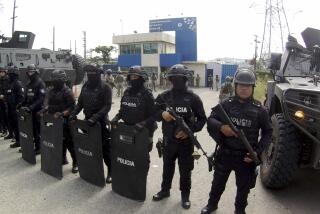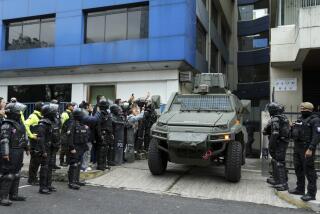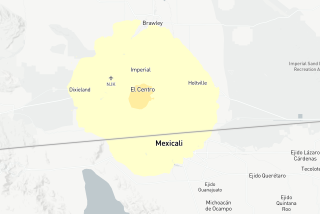A picture of devastation in Ecuador after deadly 7.8 quake
Reporting from Quito, Ecuador — At first, it seemed normal, like the dozens of earthquakes that strike every year in Guayaquil, a coastal city on the seismically active zone known as the “Ring of Fire.”
“But then things started to fall, the doors slammed and windows broke. The tremor never seemed to stop, and we started hearing screams,” said Caroll Cedeno, 33, who lives in a fourth-floor apartment in the city of 3 million, Ecuador’s largest. “We ran out of the apartment and all our neighbors were already outside.”
Cedeno’s apartment building withstood the magnitude 7.8 quake, which struck just before 7 p.m. Saturday. But others in cities on Ecuador’s Pacific coast weren’t as lucky. The temblor destroyed hundreds of buildings, killed at least 238 people and injured more than 1,500.
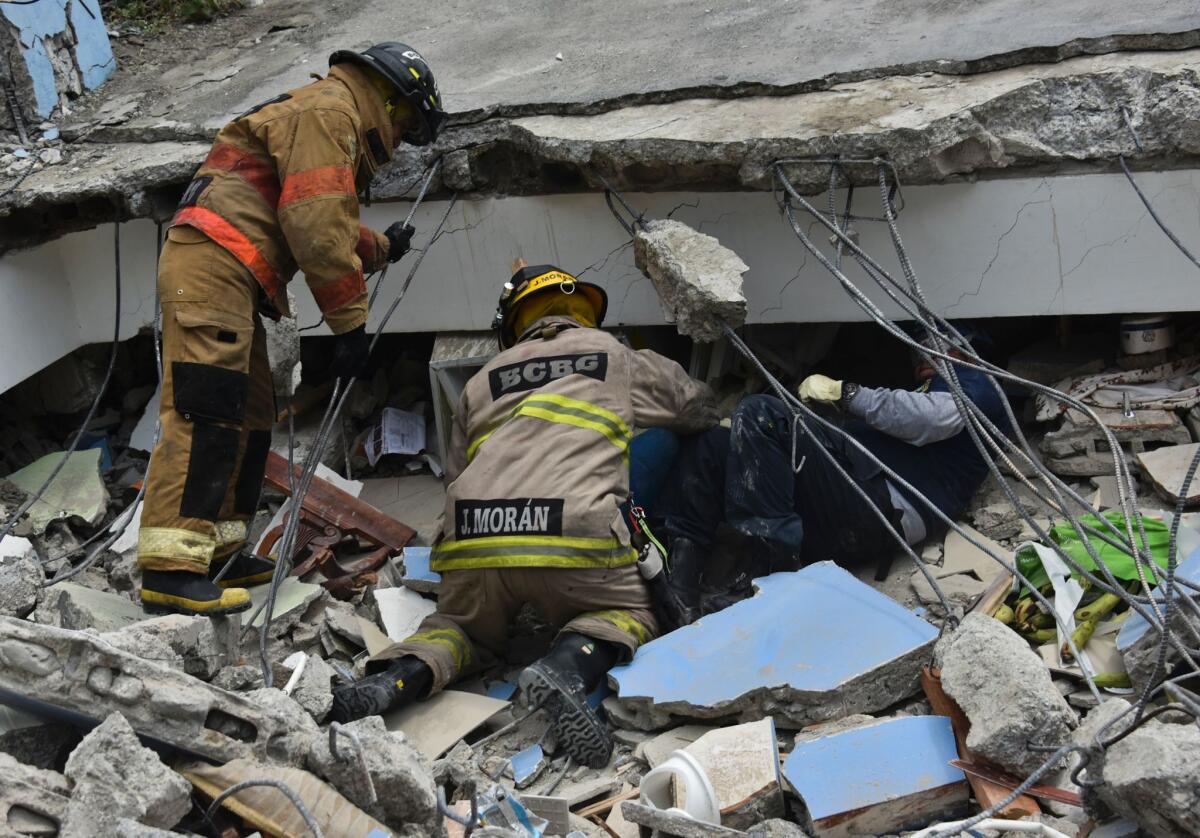
Rescue workers search for survivors in Gauyaquil, Ecuador, on Sunday after a massive earthquake
On Sunday, as emergency officials assessed the damage and rescue teams raced against time, television images showed pancaked apartment buildings, crumbled roads and the bodies of victims left on sidewalks. After walls of a prison in the town of Portoviejo collapsed, 100 prisoners escaped, authorities told news media.
Cedeno and her daughter slept outside under a tent in a park Saturday night, fearful that the tremors would continue. “My daughter didn’t sleep at all,” she said in a telephone interview. “We felt many aftershocks and were afraid that our building would collapse.”
Although Guayaquil sustained significant damage, the hardest-hit cities were along the coast farther north. In Pedernales, population 48,000, local media reported that 80% of the buildings had collapsed or were severely damaged. A majority of the deaths from the quake were reported to have occurred there, although officials had not released specific locations of deaths as of Sunday afternoon.
“Pedernales is devastated,” Mayor Gabriel Alcivar told one TV reporter. “Every building of two stories or more has been destroyed. There are survivors still under the rubble.”
In Manta, the country’s second-largest port city after Guayaquil, the airport control tower collapsed. In Chone, a hospital floor collapsed. A hospital in the coastal city of Caraquez reported that it ran out of room and medical supplies for the injured.
In Guayaquil, the quake caused several deaths and the collapse or ruin of apartment buildings and bridges. Chaos reigned in much of the city as communications and traffic came to a near standstill.
Ecuadorean officials were still assessing the damage, but repairs are expected to cost in the billions of dollars. Government officials said 10 coastal roads had been closed, with resulting congestion made more acute by relatives from the interior of Ecuador clogging highways to try to reach loved ones.
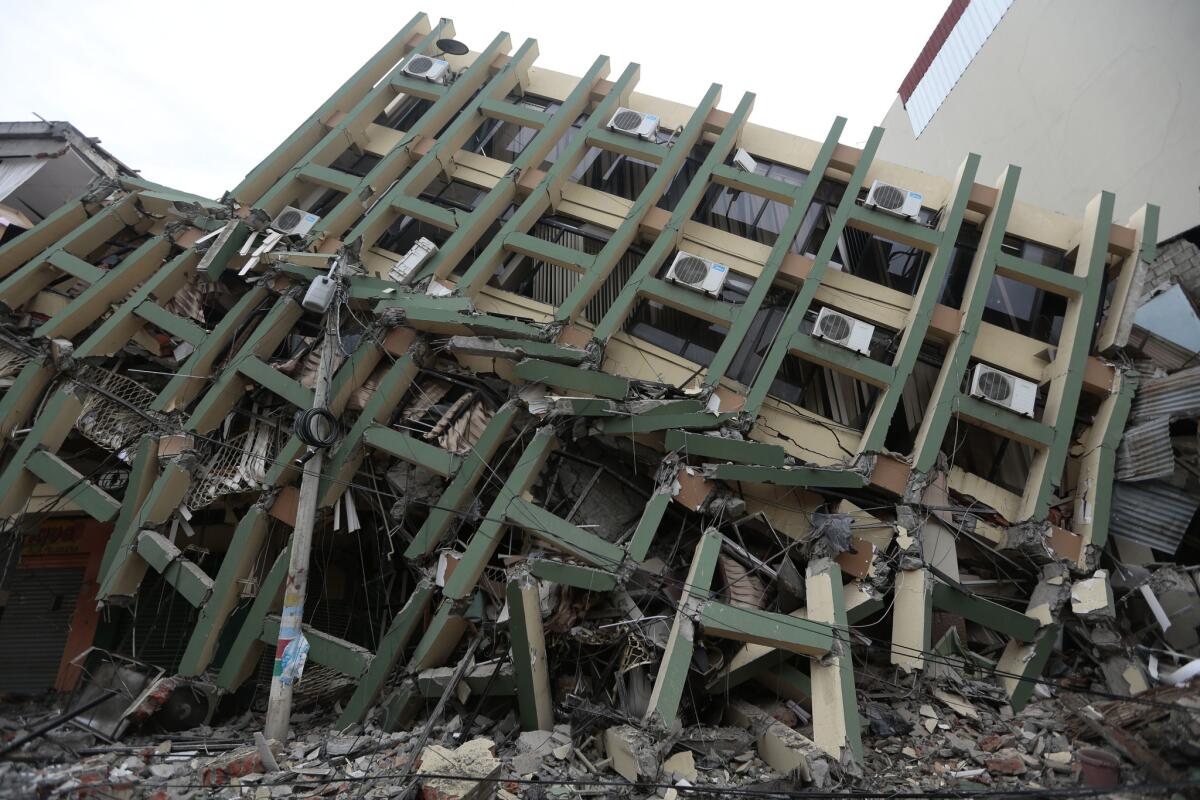
A building is toppled in Portoviejo, Ecuador, on Sunday after an earthquake the day before.
The government announced early Sunday that it was sending 10,000 soldiers to the zone to assist in rescue and security operations. Scattered instances of looting were being reported. Vice President Jorge Glas arrived in Manta to direct rescue efforts, and President Rafael Correa cut short a trip to the Vatican and was expected to arrive in Manta late Sunday.
Before leaving Rome, Correa declared a state of emergency in six states.
Glas told reporters that untold numbers of Ecuadoreans were still trapped in collapsed buildings. “We haven’t been able to use heavy equipment because it could have tragic consequences for the injured” buried in the rubble, he said. “We’re here first to attend to the injured and then will come reconstruction.”
“Comrades, I urge unity, strength and prayer,” Glas said.
The quake had its most devastating effects in a 100-mile stretch of coastline that runs north from Pedernales to Esmeraldas. The area is popular with foreign tourists and surfers, as well as being a weekend getaway for Ecuadoreans from Quito and other cities in the interior. There was no word on whether foreign tourists were among the victims.
The quake, the most powerful to strike Ecuador since the late 1970s, was also felt in the capital, Quito, and in the southern city of Cuenca, home to many U.S. retirees, but officials reported only minor damage there.
“I thought the world was coming to an end. But luckily God continues to still love us,” said Portoviejo resident Luis Alcivar, no relation to the Pedernales mayor.
But a Pedernales resident, Vanessa Santos, was more frantic, telling reporters that several family members had died in their house, which collapsed during the quake. “My sisters, my brother-in-law, my nephews – all are buried and no one is doing anything about it,” she said.
Neighboring countries, including Venezuela, Colombia and Mexico, pledged to send emergency supplies and personnel to Ecuador to assist in the recovery efforts.
The earthquake came just hours after a magnitude 7.0 temblor killed eat least 41 people in Japan, which is on the western rim of the Ring of Fire.
The Pacific coastal region of South and Central America is highly active seismically and has suffered devastating quakes in recent years. In addition to a 2010 quake and tsunami in Chile, which killed 550, Peru’s central coast suffered a quake in 2007 that killed 519.
Special correspondents Viteri and Kraul reported from Quito and Bogota, Colombia, respectively.
ALSO
9 injured, including 3 children, in North Hills crash
Are you an independent voter? You aren’t if you checked this box
Lives are ‘in limbo’ after a series of devastating earthquakes in Japan
More to Read
Sign up for Essential California
The most important California stories and recommendations in your inbox every morning.
You may occasionally receive promotional content from the Los Angeles Times.
